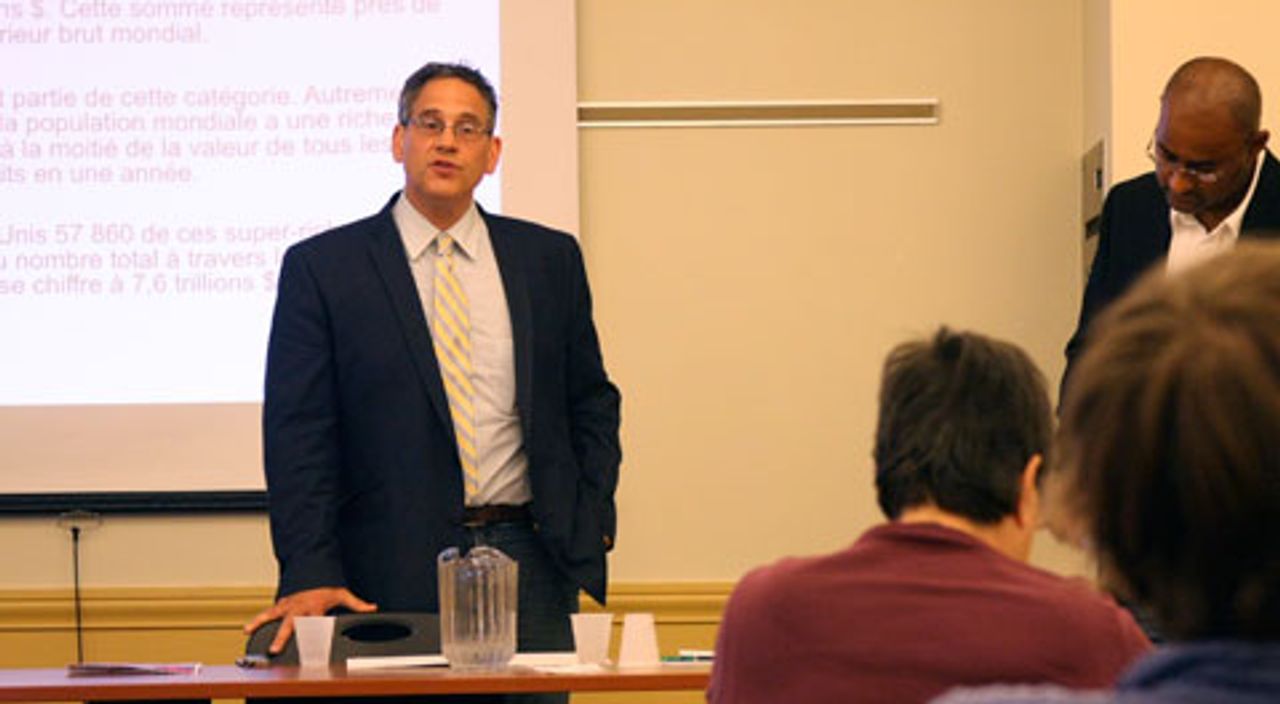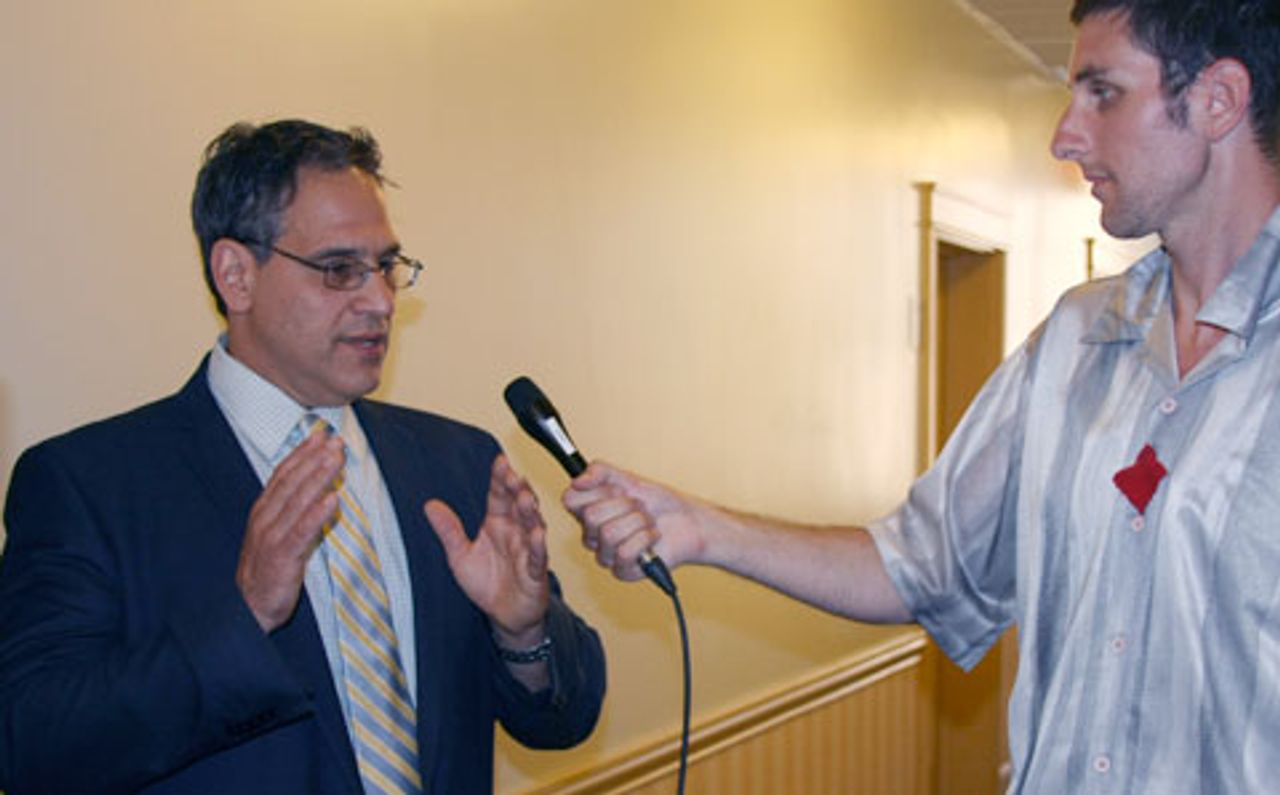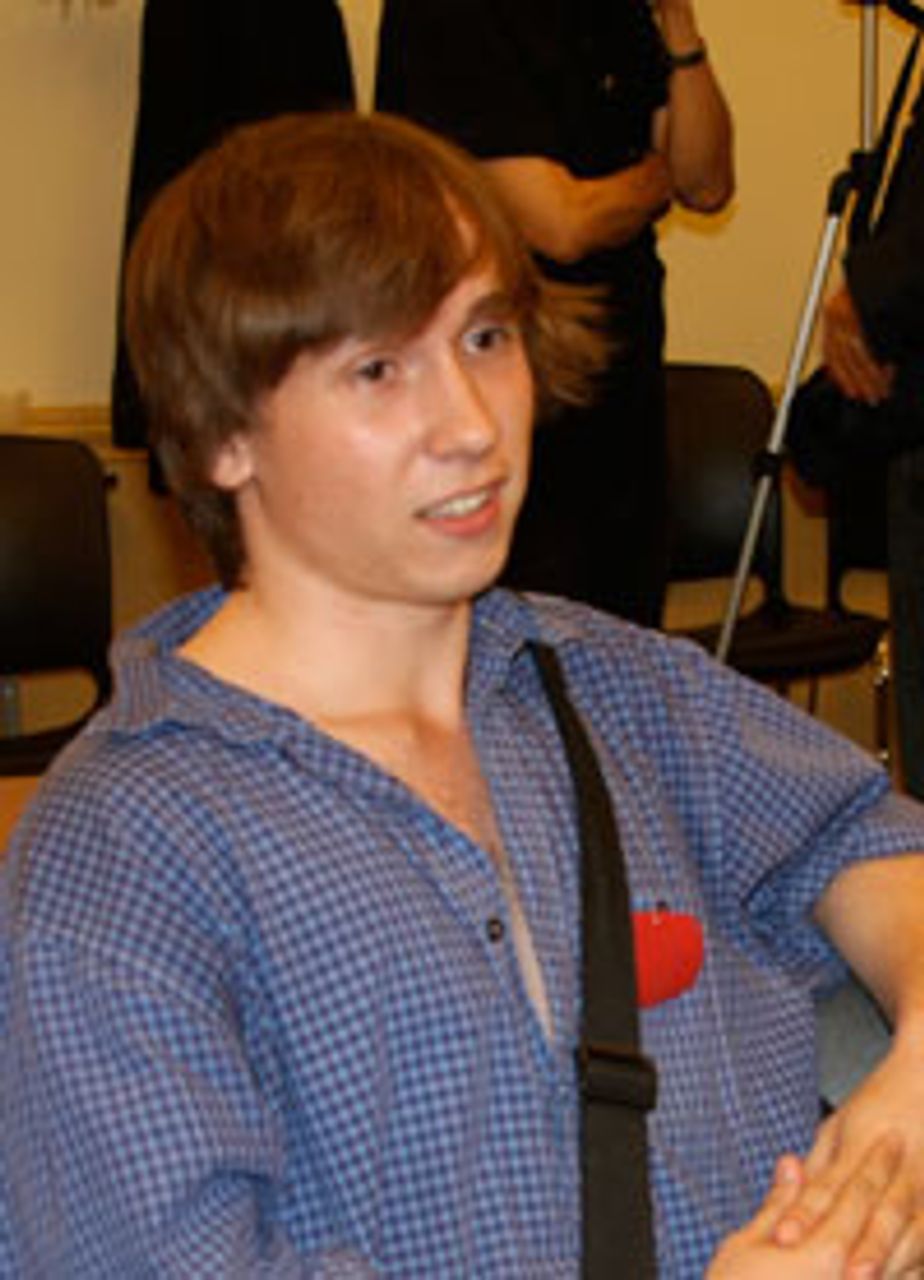 Jerry White addressing the Montreal meeting
Jerry White addressing the Montreal meetingSocialist Equality Party candidate for US president Jerry White spoke at public meeting in Montreal Thursday night on the international importance of the four-month-long strike by Quebec students. The meeting, sponsored by the SEP (Canada), was held to elaborate a strategy to mobilize the working class against the attack on public education and repression by the Charest government.
The well-attended meeting attracted students from several campuses and workers from throughout the metropolitan area. The gathering took place on the eve of mass demonstrations in Montreal and Quebec City. White and SEP supporters distributed a statement on the way forward for students at Friday’s demonstration in Montreal where an estimated 100,000 protesters took part. (See Quebec demonstration report.)
 White being interviewed by the campus TV station
White being interviewed by the campus TV stationBefore the meeting, the SEP candidate was interviewed by Concordia University TV (CUTV), a student-run network, whose reporters have been arrested and victimized by police for publicizing the strike. The CUTV reporter said he specifically wanted to interview a socialist candidate from the United States because he felt the student struggle had to be guided by a broader, global perspective.
White told the reporter that his presence in Montreal was not a diversion from the US presidential campaign but “expresses the essence of our struggle for the international unity of the working class and socialism.”
Keith Jones, the national secretary of the SEP (Canada), chaired the meeting and SEP member Richard Dufour gave the opening report. The meeting was conducted in both French and English.
Dufour opened by focusing on the international character of the assault on the living standards of the working class. Greece, he said, was the “lab of social-counterrevolution for the European ruling class, where the financial markets are imposing a reduction of living standards unparalleled in peacetime.” The globally coordinated attack on the working class, he said, had to be answered with the development of an international counter-offensive of the working class based on a socialist program.
Dufour explained that the unions and Quebec Solidaire (QS) were trying to divert the student strike into a campaign for the election of the Parti Quebecois. The PQ, he said, was the second party of the Quebec capitalist class, and when it was in power it carried out brutal cuts and strikebreaking against worker struggles. The perspective of the student association, CLASSE, that protests would force Charest to bend, was equally bankrupt, and it too looked to the unions and ultimately the PQ for salvation.
“Only the SEP has had a revolutionary perspective from the beginning, one which calls for students to turn to the working class and transform the struggle to defend social and democratic rights into a political struggle by the working class for power and the socialist reorganization of economic and political life to assure that education and all social rights are guaranteed to all.”
White expanded on these themes. “In this struggle, the students of Quebec are giving voice to the growing social opposition to the demands of the global banks and major corporations. In every country, from Canada to the US and Greece to Spain, the ruling classes are determined to make working class and young people pay for the breakdown of the world capitalist system.”
White continued, “The demand by students that education be a social right places them in a conflict with the entire economic and political order. The realization of this and other essential social rights, including the right to a secure and good-paying job, health care, housing and a future free from war, is above all a question of what class holds political power.”
“The last year has seen the rise of the class struggle worldwide, from Tunisia and Egypt, to general strikes in Greece and Spain and mass protests in the US state of Wisconsin and against Wall Street. These eruptions have exposed all of the claims about the end of history and the class struggle after the collapse of the USSR. But they also revealed the immense crisis of political leadership and perspective in the working class.
“The lack of a political party of the working class in Egypt, prepared and willing to take power in its own hands, has allowed the US-backed military junta to consolidate its dictatorship. The social upheavals of the Arab Spring have been manipulated by imperialism to launch wars and install a puppet regime in Libya and stoke a sectarian civil war in Syria.
“Here in Quebec, the political organizations around CLASSE have rejected any struggle to transform the student strike into a class movement of the entire working class against the austerity measures being demanded by Charest, Harper and all the big business parties. Instead, they promote illusions in the PQ, which carried out the deepest cuts in the history of Quebec, and the trade unions that function as the labor policemen for the bourgeoisie.
“The Socialist Equality Party in the US and Canada is setting out to resolve the crisis of leadership in the working class. We have intervened in the US elections to provide a political alternative to the two big business parties, and oppose all of those who promote the lie that the Democratic Party is the lesser evil.”
After the main reports were given, there was an animated question-and-answer session.
One audience member asked White to explain the SEP’s attitude to the Occupy Wall Street movement. White said the movement initially attracted support because it tapped into the deep anger over the growth of social inequality. However, the largely anarchist politics of its leaders and their prohibition against any discussion of program and politics left it susceptible to being taken over by the trade unions and ultimately transformed into little more than a vehicle for the reelection of President Obama.
Rather than a struggle to put an end to capitalism, he said, the movement’s program was guided by the interests of upper-middle class elements upset with the present distribution of wealth and determined to get more of a share for themselves.
A worker who was in El Salvador during the 1980s when US-backed death squads were conducting a bloody counter-revolution against political opponents asked if the SEP would consider joining with other “progressive” organizations.
“The SEP and the International Committee of the Fourth International,” White said, “fight to draw the most critical lessons from the struggles of the working class and socialist movement over the last 150 years. We have defended an internationalist and socialist strategy against all of those forces who have rejected Marxism and looked for various substitutes for the building of a revolutionary party of the working class, whether through the glorification of peasant guerrillas and Castroism, the adaptation to Stalinism and social democracy or the various forms of identity and ‘New Left’ politics in the US and Europe.”
These forces have been transformed into “left” pillars of the bourgeois political establishment, White said. “As for our party, our decades-long struggle for the principles of internationalism and the political independence of the working class has prepared us to give conscious expression and leadership to the mass upheavals of workers and young people today. We are not looking for ‘progressives’ to join but to build a political party of the working class in Canada, in the US and internationally that will be prepared to take political power.”
 Felix
FelixA young student, Felix, asked about the SEP’s attitude to demand for Quebec independence and the party’s insistence that the student struggle should go beyond the borders of Quebec.
In reply Keith Jones stressed that workers all over the world were facing common problems, arising from the crisis of world capitalism, and that the only viable perspective was one based on the unification of the international struggles of the working class.
He explained how the militant upsurge of the working class in Quebec in the late 1960s and early 1970s had been diverted and politically suppressed through its harnessing via the unions to the big business Parti Quebecois.
After the formal discussion ended, the meeting broke up into several smaller groups that held animated discussions for another hour.
One student at the meeting joined the campaign team to distribute the SEP statement at the demonstration the following day.
